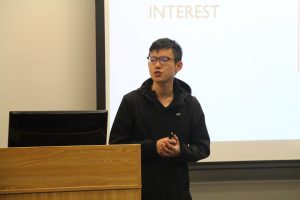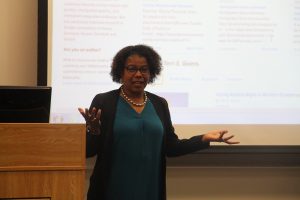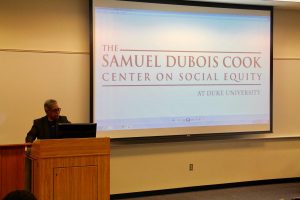
Undergraduate student presenter
On December 6, 2019, the last day of classes for the fall semester, the Samuel DuBois Cook Center on Social Equity at Duke University hosted the capstone conference for its latest Global Inequality Research Initiative (GIRI). Undergraduate and graduate students convened to present and discuss their semester-long research, all centered around the intersecting topics of race, gender, and entrepreneurship. Student inquiries reflected a wide range of interests: from explorations of the recent and hyperlocal effects of entrepreneurship and gentrification in Durham and urban renewal in Detroit to investigations of national and international trends, like whether the passage of the Fair Housing Act in 1968 allowed for greater black home ownership in the South and how a lack of economic opportunities in Mexico can motivate individuals to traverse borders and start their own business.
 Unsurprisingly, the researchers by and large identified the presence of systemic factors that explained modern-day inequities. In her exploration of how racial discrimination influences the market value of intellectual property–one study found that black American inventors only received 6 patents per million people, while the rate for the overall population is 235 patents per million–senior Kennedy Ware succinctly summarized how historical biases have contributed to modern wealth disparities. “We see that it’s not that black people weren’t innovating and creating things,” she said, “but that they weren’t able to reap the benefits of these innovations.” Ware’s presentation coincided nicely with the opening keynote address from Dr. Ruthie Lyle, the restless innovator who is believed to have the most patents (177) of any black woman in the world. Lyle’s talk detailed how she approaches her concepts for patents and brainstorms ideas on the cutting edge, emphasizing that to be successful, an inventor must be sensitive to current and future problems: “You have to have a level of empathy for this to work,” she said.
Unsurprisingly, the researchers by and large identified the presence of systemic factors that explained modern-day inequities. In her exploration of how racial discrimination influences the market value of intellectual property–one study found that black American inventors only received 6 patents per million people, while the rate for the overall population is 235 patents per million–senior Kennedy Ware succinctly summarized how historical biases have contributed to modern wealth disparities. “We see that it’s not that black people weren’t innovating and creating things,” she said, “but that they weren’t able to reap the benefits of these innovations.” Ware’s presentation coincided nicely with the opening keynote address from Dr. Ruthie Lyle, the restless innovator who is believed to have the most patents (177) of any black woman in the world. Lyle’s talk detailed how she approaches her concepts for patents and brainstorms ideas on the cutting edge, emphasizing that to be successful, an inventor must be sensitive to current and future problems: “You have to have a level of empathy for this to work,” she said.
At lunchtime, Henry C. McKoy Jr., the director of entrepreneurship at the NC Central School of Business, detailed with students the nine keys to a visionary business, noting their applicability regardless of the researchers’ future career paths. “Whether you feel like you’re ever going to start a business or not, you’re going to be an entrepreneur,” McKoy said. “In this day and age, you’re your own corporation.”

William A. Darity Jr. giving final remarks to end GIRI capstone
In his closing remarks, William A. Darity Jr., the director of the Cook Center and a professor of public policy, African and African American Studies and economics, effusively praised the semester’s worth of research, encouraging students to take the next step to publishing their work in academic journals. While Friday’s session marks the conclusion of this GIRI seminar, the work of understanding global inequality certainly continues. The Cook Center will lead two GIRI seminars in the spring 2020 semester: one centered on the global domestic policy, and a second on the racial wealth gap.
Learn more about Global Inequality Research Initiative (GIRI). Find more picture from this event on Flickr.
#GIRICapstone2019
